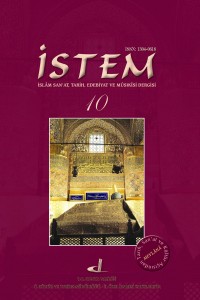Öz
Mevlâna’nın kadın ve erkeğe bakış tarzı; bütün dinlerde ve toplumlarda asırlardır devam eden kadına dair tartışmalara çözüm getiren cinstendir. Rehber bir eser olan Mesnevî’de, örnek insan olmanın tarifini veren Mevlâna, cinsiyet ayrımı yapmaz, insan olma ölçüsüne değer verir. Bu konuda her iki cinsin de yaratılış, kulluk sorumluluğu, hak, görev ve akıbet bakımından eşit olduklarını açık dille ifade eden Kuran-ı Kerim’deki esaslara bağlıdır. Mevlâna, kadın ve erkeği toplumun eşit birer parçası olarak görür. Hayatın devamı her iki cinsin beraberliğiyle mümkündür. Dolayısıyla erkeğe üstünlük tanıyan yaygın toplumsal kanaate katılmadan; fertlerin, ailenin ve toplumun mutluluk ve huzuru, ancak bu iki cinsin eşit şartlarda, sevgi bağıyla birlik ve dayanışma içinde olduğu zaman bulacağı görüşündedir. Bu yüzden sağlıklı bir aile için eşlerin birbirine denk olması gerekir. Diğer yandan, erkek kadından üstündür tarzında bir kıyas hatalıdır. Cinsiyet, bir üstünlük ölçüsü değildir. Bu şuura sahip olgun erkekler kadına değer verirken; tek meziyeti bedensel gücü olan cahiller kadını ezer. Mevlâna’nın, Mesnevî’de nefsi ve dünyayı kadına; aklı ve gökyüzünü de erkeğe benzetmesi ise kadınların olumsuz, erkeklerinse olumlu özelliklere sahip olmasına değil; asırlardır devam eden toplumsal rollere bağlıdır. Sonuçta Mevlâna’nın bu konudaki görüşleri; insana insanlık kazandıran akıl ve ruhun cinsiyetinin olmadığı ve insan olma şuurunun cinsiyete değil, şahsiyete bağlı olduğu tarzındadır
Kaynakça
- » Aydın, M. Akif, “Kadın (İslâm’da Kadın)”, TDV İslâm Ansiklopedisi, İstanbul 2001, 24: 86- 94.
- » Mevlâna, Mesnevî, çev.: Veled İzbudak, C. I-VI, İstanbul 1971.
- » Müştâk Baba, Dîvân, haz.:Mehmed Kemal Gündoğdu, İstanbul 1997.
- » Özek, Ali ve diğ., Kur’ân-ı Kerîm ve Açıklamalı Meâli, Ankara 1993.
- » Yakıt, İsmail, “Batı Düşüncesi ve Mevlâna’da Kadın”, Selçuk Üniversitesi III. Uluslar Arası Mev- lâna Kongresi 5–6 Mayıs 2003-Bildiriler, Konya 2004: 135–148.
Öz
Mawlana’s way of understanding woman and man is a kind which brings solution to discussions on woman continuing in all religions and societies for the ages. In the guide book, Mathnawi, Mawlana, describing how the model human being can be, makes no discrimination in gender and appreciates just being human. In this respect, he is faithful to the principles in the Qur’an which declares that both genders are equals in terms of creation, responsibility of worship, rights, duties and fate. Mawlana sees woman and man as the equal parts of the society. Life can continue only with the unity of every genders. So, he has the idea that without sharing the common perception of man superiority the individuals, family and society will achieve happiness and peace only when both genders are incorporated with love in equal conditions. So, for the healthy family, husband and wife should be peer. On the other hand, it is wrong an analogy that man is superior to woman. Gender is not a measure of superiority. While the matured men of this conscious are appreciating the woman, the ignorants who have only the physical power oppress them. Mawlana’s using metaphors of “nafs” and “world” for woman and “reason” and “heaven” for man in Mathnawi is based on persisting social roles for the ages, not on the fact that the women have negative features and the men have positive features. As a consequence, Mawlana’s ideas in this matter are that reason and soul have no gender and conscious of being human is based on personality, not on gender
Kaynakça
- » Aydın, M. Akif, “Kadın (İslâm’da Kadın)”, TDV İslâm Ansiklopedisi, İstanbul 2001, 24: 86- 94.
- » Mevlâna, Mesnevî, çev.: Veled İzbudak, C. I-VI, İstanbul 1971.
- » Müştâk Baba, Dîvân, haz.:Mehmed Kemal Gündoğdu, İstanbul 1997.
- » Özek, Ali ve diğ., Kur’ân-ı Kerîm ve Açıklamalı Meâli, Ankara 1993.
- » Yakıt, İsmail, “Batı Düşüncesi ve Mevlâna’da Kadın”, Selçuk Üniversitesi III. Uluslar Arası Mev- lâna Kongresi 5–6 Mayıs 2003-Bildiriler, Konya 2004: 135–148.
Ayrıntılar
| Diğer ID | JA66JH58KT |
|---|---|
| Bölüm | Araştırma Makaleleri |
| Yazarlar | |
| Yayımlanma Tarihi | 1 Aralık 2007 |
| Gönderilme Tarihi | 1 Aralık 2007 |
| Yayımlandığı Sayı | Yıl 2007 Sayı: 10 |

